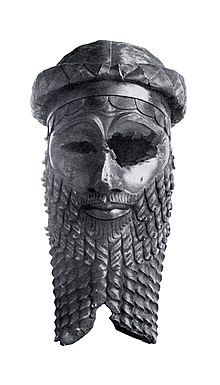Sargon of Akkad
| Sargon of Akkad | |||||
|---|---|---|---|---|---|
| King of Akkad, Kish and Sumer. | |||||

Bronze head of an Akkadian ruler, discovered in Nineveh in 1931, presumably depicting either Sargon or Sargon's grandson Naram-Sin.
|
|||||
| Reign | c. 2350 – c. 2279 BC (MC) | ||||
| Successor | Rimush | ||||
| Born | c. 2350 BC Azupiranu |
||||
| Died | c. 2279 BC Akkad, Mesopotamia |
||||
| Spouse | Tashlultum | ||||
| Issue | Manishtushu, Rimush, Enheduanna, Ibarum, Abaish-Takal | ||||
|
|||||
| Dynasty | Akkadian (Sargonic) | ||||
| Full name | |
|---|---|
| Šarru-kin |
Sargon of Akkad (Akkadian Šarru-ukīn or Šarru-kēn; sometimes known as "Sargon the Great") was the first ruler of the Semitic-speaking Akkadian Empire, known for his conquests of the Sumerian city-states in the 24th to 23rd centuries BC.
He was the founder of the "Sargonic" or "Old Akkadian" dynasty, which ruled for about a century after his death, until the Gutian conquest of Sumer. The Sumerian king list makes him the cup-bearer to king Ur-Zababa of Kish. His empire is thought to have included most of Mesopotamia, parts of the Levant, besides incursions into Hurrite and Elamite territory, ruling from his (archaeologically as yet unidentified) capital, Akkad (also Agade).
Sargon appears as a legendary figure in Neo-Assyrian literature of the 8th to 7th centuries BC. Tablets with fragments of a Sargon Birth Legend were found in the Library of Ashurbanipal.
The Akkadian name is normalized as either Šarru-ukīn or Šarru-kēn. The name's cuneiform spelling is variously LUGAL-ú-kin, šar-ru-gen6, šar-ru-ki-in, šar-ru-um-ki-in. In Late Assyrian references, the name is mostly spelled as LUGAL-GI.NA or LUGAL-GIN, i.e. identical to the name of the Neo-Assyrian king Sargon II. The spelling Sargon is derived from the single mention of the name in the Hebrew Bible, as סַרְגוֹן, in Isaiah 20:1 (the reference is to Sargon II).
...
Wikipedia
